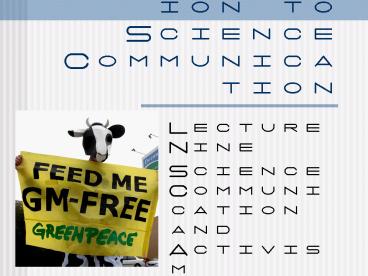HPSC1008: Introduction to Science Communication - PowerPoint PPT Presentation
1 / 11
Title:
HPSC1008: Introduction to Science Communication
Description:
increasingly important as a source of science information in ... challenge is how they position themselves in relation to ... dismantling. Deep ... – PowerPoint PPT presentation
Number of Views:34
Avg rating:3.0/5.0
Title: HPSC1008: Introduction to Science Communication
1
HPSC1008 Introduction to Science Communication
- Lecture Nine
- Science Communication and Activism
- Monday 1st December
2
Activist groups
- increasingly important as a source of science
information in science policy, and other public
arenas - challenge is how they position themselves in
relation to scientific orthodoxies - very important in supplying arguments about and
publicising problems in relation to different sci
issues. - Many groups campaign against a number of sci
issues or issues that have a sci element. - Nuclear
- Environment
- Animal experimentation
- So these groups also are involved in
communicating science in public sphere
3
Activist groups as credible sources of science
- Science and scientists built up their own
cultural and cognitive authority in public sphere
over centuries - Many different ways
- Unwritten rules of popularisation one way of
ensuring only right message goes out to public - Enforcing a top-down approach to science
communication - i.e. scientists in control
- How do activist groups gain the authority needed
to go up against scientific/political
institutions? - Scientific credibility refers to the capacity of
claims makers to enrol supporters behind their
claims, to legitimate their argument as
authoritative knowledge and to present themselves
as the sort of people who can give a voice to
science.
4
Case Study 1 Environmental Groups
- Environmental Groups use mass media in very
effective way - Key to raising issues, and own identity
- Greenpeace Media Study (Hansen) 1987 - 91
- Greenpeace coverage very favourable
- Understand how newsmedia works
- Becomes representative of not just scientific
issues, but social values, concerns about the
environment - Most important feature in terms of forging
credibility is to conduct own science - Allows them to meet scientists on their own terms
- Harder to dismiss as crazy treehugging hippies
5
Brent Spar
- 65,000-ton decommissioned oil platform
- 3 years of study to work out how to dispose of. 2
solutions reached - Horizontal dismantling
- Deep sea disposal
- Shell opted for latter and Greenpeace raised
scientific objections - Rig still had toxic sludge in it
- Occupied rig in 1991 to conduct own tests to
prove their point
6
Brent Spar II
- Greenpeace not only mobilised own scientific
research but questioned validity of Shells - By mobilising both media campaign and scientific
campaign Greenpeace successful in getting Shell
to drop plans - Gained credibility as a legitimate voice of
science - Hansen content analysis study
- Science and related synonyms (scientist,
scientists, scientific) appeared 139 times
between 1987-8 but 249 times between 1990-1 - Words Science and research appeared within
ten words of Greenpeace in 45 cases in earlier
year and 73 case for later
7
Case Study 2 AIDS activism
- Patient groups another key space in which science
and sctivism has met. - 1980s saw many activist groups in US become
concerned with spread of HIV/AIDS - Borne out of already established groups from
within gay and lesbian movement - Lots of people with a lot of cultural capital
already (white, middle class educated men) - So already organised as a group
- Concern over the access to HIV medication and
drug trials - Both scientific matters
- Question was how to be taken seriously?
8
AIDS activists
- Clinical Trials tricky subject
- Public health aims and clean data vs patient
risks and use of placebos - In HIV case placebo group would die
- In case of access to drugs, again need for
medical science to do things one way conflicted
with activists ideas about what was ethical - Formation of own communication networks key to
challenging science
9
AIDS activists II
- Different tactics used to become effective and
credible challengers to orthodox medical science - Become the scientist
- Learn the language and culture of science
- gained access to institutions, conferences, speak
on scientists terms - Newsletter produced which flagged up new
treatments - Provided glossary of terms
- Could then challenge the science of clinical
trials - Become the voice of the research populations
- Only get access to trial patients through us, so
do what we say! - Mixing moral and methodological arguments about
efficacy of drug trials - Scientific argument - not representative
- Moral argument - about access for all/anti
discrimination
10
Conclusions
- Activists mobilise science in the public and
scientific spheres a lot - empirical claims about the state of the natural
world are core to their message. - often have to carry out this communication in
circumstances where they disagree with the
orientation of large parts of the scientific and
technological establishment - developed tools of argumentation for tackling
this job. - Establishing themselves as a credible
communicator of science is key
11
Research Task - Week 10
- Go and find literature from activist
organisations on scientific issues - Environment
- Animal rights
- Nuclear energy
- Intelligent design etc
- Research into any specific campaigns they might
have conducted - Think about what tactics they have used to
communicate the issue - Use of media?
- Moral and/or scientific arguments?
- Credible use of science?































